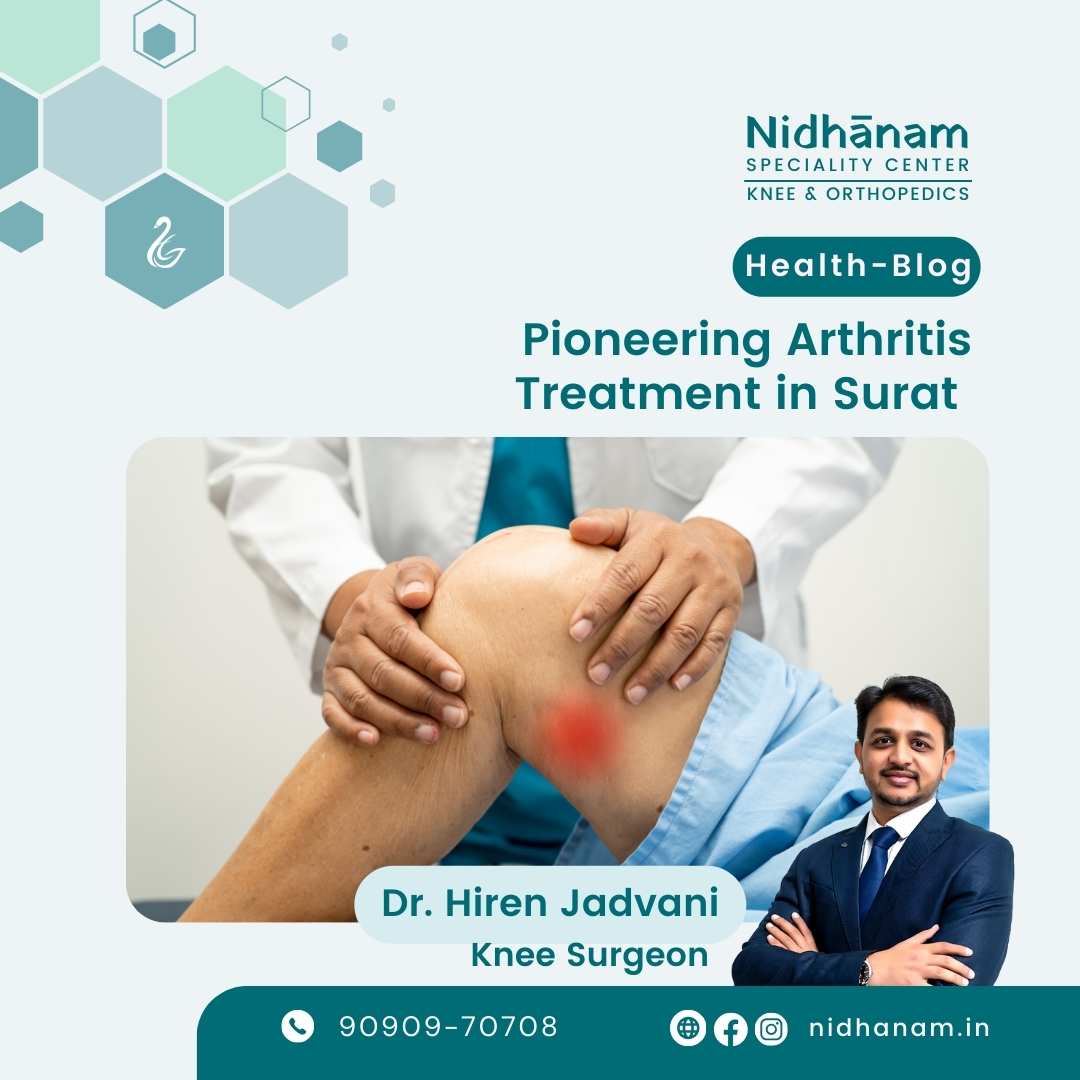Nidhanam Orthopedics Speciality Center in Surat, led by the renowned orthopedic surgeon, Dr. Hiren Jadvani is at the forefront in pioneering arthritis treatment in Surat. At Nidhanam, we offer a spectrum of both surgical and non-surgical approaches for arthritis treatment. Dr. Hiren Jadvani’s expertise encompasses joint replacement surgery, joint reconstruction surgery, arthroscopy, and comprehensive arthritis management.
Understanding Arthritis:
Arthritis is a prevalent condition characterized by inflammation of the joints, leading to pain, swelling, and decreased joint mobility. Dr. Hiren Jadvani and the Nidhanam team specialize in addressing various types of arthritis, including osteoarthritis and rheumatoid arthritis.
Symptoms and Signs of Arthritis:
- Joint Pain: Persistent pain in one or more joints.
- Swelling: Noticeable swelling, warmth, or redness around affected joints.
- Stiffness: Difficulty in moving joints, especially in the morning or after periods of inactivity.
- Reduced Range of Motion: Limited flexibility and decreased ability to perform daily activities.
Prevalence of Arthritis:
Arthritis is a common condition affecting people of all ages. The prevalence is higher in the elderly, but it can also impact younger individuals. With the aging population, the incidence of arthritis is expected to rise, making it crucial to focus on advanced treatment options.
Diagnosis of Arthritis:
Accurate diagnosis is essential for effective arthritis management. Dr. Hiren Jadvani employs state-of-the-art diagnostic techniques, including imaging studies such as X-rays, MRI, and blood tests. A thorough examination of symptoms and medical history aids in determining the type and severity of arthritis.
Management Options:
Non-Surgical Approaches:
- Medications: Pain relievers, anti-inflammatory drugs, and disease-modifying antirheumatic drugs (DMARDs).
- Physical Therapy: Customized exercises to improve joint function and reduce pain.
- Lifestyle Modifications: Weight management and joint protection strategies.
Surgical Interventions:
- Joint Replacement Surgery: For severe cases, replacing the damaged joint with a prosthetic implant.
- Joint Reconstruction Surgery: Restoring joint function through surgical techniques.
- Arthroscopy: Minimally invasive procedures to diagnose and treat joint problems.
Nidhanam Orthopedics, under the leadership of Dr. Hiren Jadvani, provides a holistic approach to arthritis treatment. Our multidisciplinary team collaborates to tailor individualized treatment plans, ensuring the highest quality care for each patient. If you or a loved one is experiencing symptoms of arthritis, consult with Nidhanam Orthopedics for expert diagnosis and personalized treatment.
Frequently Asked Questions
Arthroscopic surgery is a type of minimally invasive surgery that requires only small incisions thanks to a device known as an arthroscope. It lets your surgeon see inside the joints and view the specific area being worked on during surgery without the need for large incisions.
Arthroplasty is the reconstruction or replacement of a joint such as a shoulder, elbow, wrist, hip, knee or ankle. Depending on the extent of the joint injury or condition, you may need partial or total arthroplasty.
Like human bone, the prosthetic devices used in joint replacement surgery can become damaged or simply wear out. If you’ve previously had partial or total joint replacement surgery but need to have the joint operated on again, it’s considered revision surgery.
Advances in medical technologies — including the prosthetic materials used in total and partial hip, knee, elbow and shoulder joints — continue to extend the life expectancy of artificial joints. Generally speaking, today’s prosthetic devices can last upwards of 15-20 years. Factors that can impact the durability of prosthetics include your activity level, overall health, weight and whether you have arthritis.
While the goal of surgery is to restore function and get you moving without pain, there are usually some limitations after orthopedic surgery. Talk to your orthopedic surgeon about realistic expectations after surgery.
There’s no one-size-fits-all answer for deciding when to have surgery. Your orthopedic surgeon or other doctors will help you determine when surgery is the most appropriate next step. Key considerations include whether you’re in pain, if you’re experiencing instability or decreased mobility, and whether the injury or condition is affecting your quality of life.
For first consult, patient will be evaluated with detailed history and clinical examination before he/she is advised suitable imaging. Additionally, it will be helpful to bring along previous X-rays and scans especially related to fractures and for comparative assessment.
A fracture is a broken bone. A sprain occurs when you injure the ligaments that connect your bones.
For most of the patients, average stay after surgery is between 2-5 days, depending on the type of surgery. Discharge is planned when medical condition is stable, pain is adequately controlled with oral medications, able to eat and urinate and when physical and occupational goals are successfully met. Bracing, rehabilitation and after surgery instructions will be provided to the patient at discharge.
Following discharge after surgery, you are required to contact the physiotherapist who will help in optimum post-operative recovery. At Nidhanam Orthopedics Speciality Center we have consultant physiotherapist and rehab expert in our team of doctors to ensure smooth rehabilitation and recovery.

